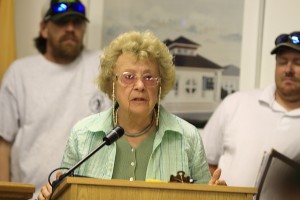DEP Signals a Deal on Public Access Rules
Kill the rule – End it, don’t mend it.
[Update: 6/7/11 – This revealing quote pretty much says it all. You see, it’s “our beach” and we must remain safe from “them”, i.e. Willie Horton and friends (from today’s Atlantic City Press story). And the crocodile tears for wetlands and birds is supreme hypocrisy, coming from people whose homes were built on environmentally sensitive dunes.
“It’s not about having people on our beach. Even if it weren’t about wetlands, it would be about us not being safe. We’d be open for stealing off-season. This is more inviting because they’d have easier access,” said Weisberg, noting that an environmental-impact study exists showing “there are wetlands on that paper street.” ~~~ end update]
Kirk Moore today wrote another superb story: Beach access sought; NJ plan may change – DEP forum draws fishermen, surfers
It clearly explores the specific current on the ground issues regarding public access, while providing readers with the troubling history that the DEP rule ignores and will return us to
To Dillingham and advocates for surfers and fishermen, the proposed DEP beach access regulations look like a formula for returning to the 1960s, when seaside towns used arbitrary rules to discriminate against visitors, and private beach associations ruled over the sands like tiny city-states. …
“It will provide towns with the means to close access as they see fit,” said Paul Harris, president of the New Jersey Beach Buggy Association, a surf fishermen’s group whose members worry towns will reinstate curfews instead of the 24-hour access state rules have guaranteed
It perfectly captures the concerns expressed by hundreds of people, hitting the high points of testimony at the Long Beach hearing:
In the public hearing, islanders and visitors alike spoke warmly of what the beaches mean to them.
“These beaches bring regeneration to people,” said James Hill, a Pennsylvania angler. “There’s no reason why we can’t agree to keep the beaches free and open to the public.”
Retired DEP fisheries biologist William Figley of Stafford said he worries the rule change will accelerate the loss of land to public recreation.
“Once you lose access,” Figley warned, “It’ss gone forever.”
 The only important issue Kirk left out was the powerful testimony on behalf of urban residents, who will lose access (sorry, I can’t recall the woman’s name who testified).
The only important issue Kirk left out was the powerful testimony on behalf of urban residents, who will lose access (sorry, I can’t recall the woman’s name who testified).
[Note: Deb Mans just advised that it was Elizabeth Ruebman from NY/NJ Baykeeper. For more information on how bad this rule would be for our northern tidal waters – essentially a complete rollback of the current requirements – please visit www.nynjbaykeeper.org. As Elizabeth put it, “it can’t be a tax if you don’t own it in the first place.”]
Urban residents – many of whom lack air conditioning and cars – just want to get out of increasingly frequent extreme heat and cool down along the riverfronts of urban and older industrial river landscapes.
Those rivers already are too polluted to swim in and it is unsafe to eat the fish and crabs you catch there – just a few of many deep urban and racial environmental injustices.
Many of those families don’t have the time or resources to drive all the way down to Loveladies – (and does public transportation even go there?) where they are not wanted and are actively excluded by those offensive “Private Property – No Beach Access” signs on almost every beachfront property.
Those are the people I was thinking about when I said that the “No Public Acccess” signs along LBI reminded me of the “white’s only” signs of the South.
In case anyone felt that remark was over the top, “played the race card”, or was used as a metaphor, think again.
The signs fit within a culture and a social system of de facto racial and income segregation – including of shore housing and beaches, where the facts are so easily observable.
Those signs are posted with the same racist and exclusionary motives by the property owners.
And they have the same discriminatory on the ground consequences.
Tim Dillingham’s “separate but unequal” comment, about some people densely packed onto beaches while others enjoy a more secluded beach, was accurate and apt – not a metaphor.
That reality is no accident, but the result of racist systems and individual racism.
I am not trivializing racism by equating the effects of historical racism against blacks with beach access.
But yes, gaining access to beaches at Loveladies is like access to drinking water fountains in George Wallace’s pre-civil rights south.
The DEP’s reply to all these major problems by Ray Cantor is basically “trust us”.
Cantor insists that won’t happen with the new rules, which allow towns to submit different plans for beach access instead of hewing to specific DEP demands for numbers of access points, parking spaces and bathrooms.
“We will not approve plans that take away public access,” Cantor told the 200-plus crowd who stuffed the Long Beach town hall and spilled out into the hallways and front steps on Thursday’s warm and windy evening.
But if DEP really wanted to implement the policy that Ray Cantor keeps repeating – not allowing towns to restrict access – then they would have put specific mandates in the proposed regulation. The DEP proposal is just not a serious effort or attempt to design a local land use oriented access program, with State standards and oversight.
The DEP proposal makes submission of Municipal Access Plans voluntary and does not include any sanctions against towns for failing to submit them, or for failing to implement the plans they do submit. There are no local public participation requirements for the local planning process. These are all glaring structural defects and fatal flaws.
The rules are vague and have no enforcement mechanisms. Some provisions of the rule flat out contradict what Cantor has said. Others specifically weaken current access requirements. The propoal goes way beyond what was necessary to respond to the Avalon Court decision.
DEP is not telling the truth, particularly about the origin and intent of this proposal, which comes from the business community in the Red Tape and DEP Transition report recommendations.
I urge anyone with an interest in the details of flaws in the DEP proposal to read the comments submitted by environmental groups, which conclude:
The proposal rule, described in NGO circles as the “(No) Public Access Rule” represents an abdication of the State’s responsibility to provide open and meaningful public access to and use of the tidal waters of our State. Governor Christie recently and publicly lauded this proposal as an example of “deregulation” and the elimination of bureaucratic “red tape.” This statement stands in contrast to DEP’s attempts ”including at heavily attended public hearings during which the public repeatedly denounced the proposal” to spin these rules as protective of the public’s access. A careful examination of the proposal reveals that the Governor is correct; this proposal represents the deregulation of the public’s right to access and use tidal waters and the destruction of the represent regulatory scheme intended to preserve and protect those rights.
As described further below, DEP is proposing an approach whereby municipalities , many of whom have repeated and overtly thwarted public access to “their shores” now hold the power to dictate the terms of public access. DEP has not provided any firm standards that municipalities must meet in creating their access plans. Nor has DEP created any oversight or enforcement measures to ensure these plans are implemented so that the promised access actually results. DEP has repeatedly told the public that it has the power to withhold funding and permits from towns that do not properly promote access. But DEP has not codified those powers in this proposal. In sum, DEP has entrusted an essential public right to those who have often trampled upon it, and told the public, “Trust us, we’ll keep the towns in line.”
So sorry Ray, “trust us” to crack down on the towns and developers- in the absence of legal power to enforce that approach and regulations that flat out contradict what you say – just won’t cut it. No way, no how.
But worse than a lack of trust, there are several policies in place that contradict what you say.
The Governor’s policy position on the prior DEP public access rule is that it “offends common sense” (EO #2) and is bureaucratic “red tape” and an “unfunded state mandate” (EO #4) that must be eliminated.
The Governor has agreed with NJ BIA and the Chamber of Commerce claims that this rule is a tax on business that harms economic development. NJBIA has held this rule out as a litmus test of the Governor’s deregulatory policy commitments.
None of those Administration policies and perceptions have changed, so how could DEP enforce the policy you describe?
Continuing the slogans and rhetoric just pours gas on the fire. You know what I’m talking about: the repeated spin about “one size doesn’t fit all” and condemning “prescriptive mandates from Trenton” in favor of “flexibility” in working cooperatively with the towns.
And the proposal is so flawed, that there is no way that changes on adoption can fix the structural flaws, rollbacks, loopholes, ambiguity, and lack of enforceable standards.
And there are other provisions in the rule that flat out contradict what Cantor is saying.
And we need to be expanding access opportunities, especially in the norhern tidal rvers and urban or older industrial waterfronts.
Kill the rule – paraphrasing Bill Clinton: End it, don’t mend it.

Dorothy – sees Bolsheviks at DEP
[Update
The Star Ledger story on the hearing closed with this quote, by a beachfront property owner named Dorothy.
I had a wonderful extended conversation with Dorothy before the hearing. She told me that feels that DEP access rules “remind me of the scene from Dr. Shivago – where Yuri comes home and finds that the Bolsheviks have taken over the family’s house. I believe in private property rights”.
Here’s what she told the Star Ledger:
Dorothy Jedziniak, an oceanfront homeowner in Ship Bottom on Long Beach Island, said the public has a right to access, but “I do stand firm on private property rights “Would you like someone to sit on your front lawn?”
Which spawned this reader comment – thank goodness for interactive media:
If people were ” sitting on my front lawn ” I would have a problem . Unless of course , my front lawn was public property .
Bill
The woman you reference who gave testimony on urban access impacts was Elizabeth Ruebman from NY/NJ Baykeeper. For more information on how bad this rule would be for our northern tidal waters – essentially a complete rollback of the current requirements – please visit http://www.nynjbaykeeper.org. As Elizabeth put it, “it can’t be a tax if you don’t own it in the first place.”
@Debbie Mans
Thansk Deb. I spoke with Elizabeth for a while before the hearing. Embarrasing that I forgot! She gave great testimony!!!